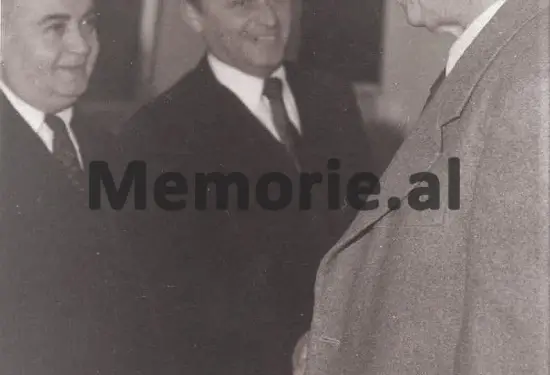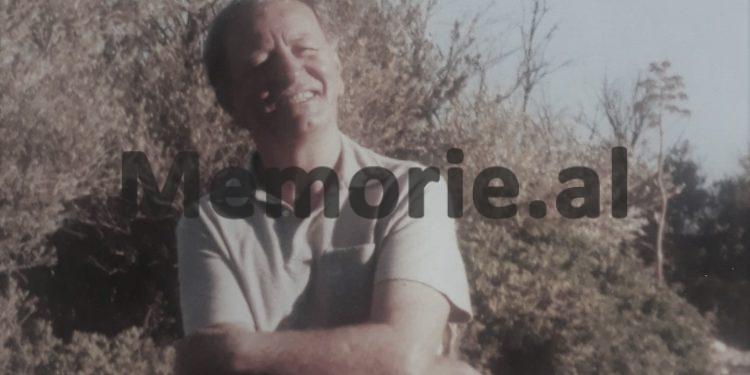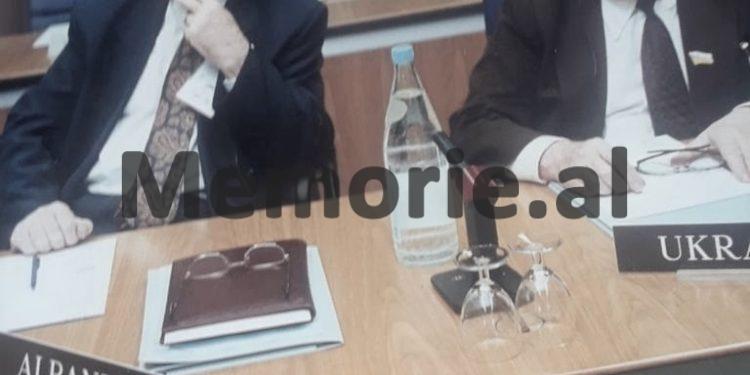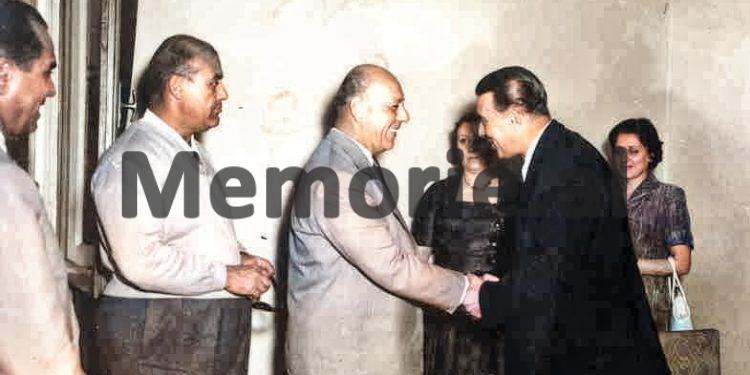By Bashkim Trenova
Part fifty-two
Memorie.al publishes the memoirs of the well-known journalist, publicist, translator, researcher, writer, playwright and diplomat, Bashkim Trenova, who after graduating from the Faculty of History and Philology of the State University of Tirana, in 1966 was appointed a journalist at Radio- Tirana in its Foreign Directorate, where he worked until 1975, when he was appointed journalist and head of the foreign editorial office of the newspaper ‘Zeri i Popullit’, a body of the Central Committee of the ALP. In the years 1984-1990, he served as chairman of the Publishing Branch in the General Directorate of State Archives and after the first free elections in Albania, in March 1991, he was appointed to the newspaper ‘Rilindja Demokratike’, initially as deputy / editor-in-chief and then its editor-in-chief, until 1994, when he was appointed to the Ministry of Foreign Affairs with the position of Press Director and spokesperson of that ministry. In 1997, Trenova was appointed Ambassador of Albania to the Kingdom of Belgium and to the Grand Duchy of Luxembourg. Unknown memories of Mr. Trenova, starting from the War period, his childhood, college years, professional career as a journalist and researcher at Radio Tirana, the newspaper ‘Zeri i Popullit’ and the Central State Archive, where he served until the fall of the communist regime of Enver Hoxha, a period of time when he in different circumstances met many of his colleagues, suckers of some of the ‘reactionary families’, etc., whom he described with a rare skill in a book of memoirs published in 2012, entitled ‘Enemies of the people’ and now brings them to the readers of Memorie.al
Continued from the previous issue
WITH “HEROES OF THE PEOPLE”
POLITICAL BUREAU AND THE PRESIDENCY
At the Albanian Women’s Congress, Sofo, always surrounded by many people, who asked him for advice on everything, continued with his style of a great man that no one and nothing catches his eye. I was already used to him and did not expect him to behave differently. I waited a moment to “reward” him with the same coin. The case did not delay.
One day I was asked to go to the Press Directorate of the Central Committee of the Party. When I went inside I saw Miti Tona, director of this Directorate, Mehmet Karakushi, a member of the Central Committee of the Party who also dealt with press problems, but mainly with the problems of Kosovo and Sofokli Lazri. I knew Mehmet Karakushi. He was a friend of Mehmet Elez. It was Mehmet Elezi who had introduced me to him. Mehmet Karakushi would then ask me to help him socially in preparing a material related to the various demonstrations or revolts that took place in Kosovo against Yugoslav rule
After the Second World War. When I gave him the material he had asked me for, as a sign of gratitude, he invited me together with Mehmet Elez to have a coffee at the Hotel “Tirana”.
Sofo Lazri was once criticized by Liri Belishova for plagiarism, taking articles from “Pravda”!
After glancing at the three, Mit, Mehmet and Sofos, I shook hands with Mit and Mehmet and pretended not to notice or forgot Sofon. He did not do it himself, but he would never forgive me for this behavior, which imitated him. There he just showed me how to write an article, that is, he gave me a journalism lecture. Before a letter, he made some lines emphasizing in each case that the article should have an introduction, a presentation of the problem and finally, the conclusions. With his dissatisfied mimicry, he seemed to mean: “I have to explain so much to you”?! While he was demonstrating, I was reminded of Qako Dango, who told me: “Liri Belishova, as a member of the Politburo that directed the Party propaganda, has severely criticized Sofon for plagiarism by the Soviet press.” At that time, the Voice of the People often published articles taken from Pravda, a body of the Central Committee of the Communist Party of the Soviet Union. Sofo, apparently, translated some of Pravda’s articles and, after making some minor changes, published them putting his name at the end.
Sofo graduated in journalism from Lomonosov University in Moscow. Out of curiosity, I read many of his articles published in “Zeri i Popullit” during the time he worked in the Editorial Office of this newspaper. He does not find any analytical article, no article to give something, a help, outside the clichés, he does not find opinion. I certainly do not want him to go outside the official line of time. He lacks the level of argumentation, of research. If one is curious, one can browse the collections of “Voice of the People” and be convinced. As for the editorial articles, which were written in the Central Committee and which, as it was said, were written by Sofo Lazri, their “magic” lies neither in the strength of the argument, nor in that of logic or analysis. It lies in the fact that in these types of articles, a categorical official position was held and that this position had no right to be declared by anyone else. In this sense, reading them gave something new to the reader. However, even in these articles, Sofo has only played the role of journalistic presentation of Enver Hoxha’s theses and opinions, which were given to him readily. When he boasted that he had written these articles, Qako Dango ironically said: “Wait until we see them republished in the works of Comrade Enver”.
While before the meeting at the Press Committee of the Central Committee, Sofos, it seems, simply did not catch his eye, then ignorance he would turn into revenge. I have previously written in my memoirs that when I wanted to leave “Zeri i Popullit”, my colleagues and friends proposed me some jobs. I can mention for example the Institute of International Relations Studies, the Institute of Marxist-Leninist Studies, the Ministry of Foreign Affairs, the Foreign Relations Sector of Trade Unions, the Foreign Directorate of Radio Tirana, the Albanian Telegraphic Agency, and the Scientific Sector of General Investigation, of any other country. None of these proposals was approved by the relevant nomenclature. They all fell in front of the “S.O.S-SOFO” sign! Sofokli Lazri prevented me from starting work in any of these institutions. Perhaps, as I now believe in the distance of time, inadvertently, he helped me because he gave his “help” to see more and more clearly how the anti-human mechanism ‘communism’ works, who set it in motion. After all I was not in Sofo Lazri nomenclature. So, as I had the opportunity to see it concretely, it was Ramiz Alia, it was Nexhmije Hoxha, those who had sealed my file. Why? Probably simply because, late, they had learned that I was the nephew of Shyqyri Peza, unwanted and why not eliminated by Enver. Sofo, perhaps, just happily played the seal holder, being removed as the seal god; he performed a service that suited his appetite as well.
How Marash Hayati remembered Sofo Lazri in his memoir “The Back Door of the Press”!
Neither Napolon Roshi nor I was an exception. Sophocles Lazri treated everyone equally, both those who licked his shoes and those who were not servile to him. He had the same behavior with members of the Central Committee or with members of the Politburo, whom he did not hesitate to leave waiting, so to go after them in any occasional activity. In his book “The Back Door of the Press”, the former member of the Central Committee of the Party, former Director of the Albanian Radio and Television and Editor-in-Chief of “Voice of the People”, Marash Hajati, mentioning Sofo Lazri, writes: “More than once we have we heard and we were confronted with categorical thoughts that S used a lot when he wanted to exclude certain people from the game: – Why is he a journalist …?! This one from Kukës, the diploma came out for us! How are you North …!? In the controversy we were having, there is no idea at all that our friend, S, says things like that, but it should not be taken lightly. The truth is quite different. This can be witnessed by many diplomats, journalists, scholars, etc., who in these types of “citations” or the so-called “Romans”, have seen deliberate behind the scenes for their dismissal, from work.
The great evil of these remarks and thoughts, in many cases, is that they not only did not stand, but were cynical, malicious. But the word was heard”! How cynical and malicious Sofo Lazri was, can be understood even from a single fact. He went to the editorial office of “Voice of the People”, to dismiss the editor-in-chief, Marash Hayati, the day his father had died. On this day, he did not spare the most unworthy words about Marashi. I also had the opportunity to meet Marash Hayati. He was one of two or three members of the Central Committee, who courageously defended the idea of establishing political pluralism in Albania. He, after the victory of Democracy, being the president of the Union of Journalists of Albania, in a joint meeting with the Union of Democratic Journalists, expressed his readiness to merge the two organizations into one. After the victory of democracy, I met him by chance on the edge of Lana, the small stream of Tirana, selling plastic household appliances.
Pathological hatred or contempt for everyone, except Enver Hoxha and Ramiz Alia, could not but return to the boomerang one day Sofo Lazri. Ever since Enver Hoxha’s time began to fall, since Ramiz Alia showed him that he was neither a “dwarf” nor a “giant”, that is, that it was an accident in the completely accidental leadership of the Labor Party, he was targeted in himself Central Committee of the Party. Reading the minutes kept in one of the meetings of the Central Committee of the time, we read, for example, Marash Hayati said: “It is time to admit that we have failed.”People cannot stand the misplaced privileges, Sofokli Lazri’s grooms or Comrade Sofo’s whiskey bottles.” In “Rilindja Demokratike”, Neshat Tozaj, who was once the head of the Crime Laboratory at the Ministry of Interior, also known as the author of cinematographic scripts and novels, especially the novel “Knives”, which seemed brave for the time, without being such, published a highly critical article on Sophocles Lazarus. Frrok Çupi, editor-in-chief of “Rilindja Demokratike”, before the publication, laughing, gave me to read Neshat’s article. He knew I would like it. I have only added one phrase to this article.
Sofo Lazri tricks in the interview given to his former student!
In an interview given by Sofokli Lazri to his former student, Apostol Duka, he accuses all those who have criticized him as: “People who do not respect at least the most basic ethics, who have nothing sacred in life, who scoff at the way their political opponents speak and express themselves. Behold, I am from Vuno, and there is no harm in speaking or thinking likes a Vuno. Is this something to be talked about …?! But to go out and reply to someone who insults me why I buy my costumes in New York and Paris and not in Tropoja, why I keep my glasses clean, not dirty, why I prefer goat meat and not pork, I will “They took me crazy.”
Sofo cheats as he has cheated all his life. He responded to “Zeri i Popullit”, for example, Neshat Tozaj and he wrote a second article critical of him. After that he was really silent, but not for the reasons he mentions. Even the interview he gave to Apostol Duka, he published only after the death of Sofos. That’s because Sofo knew what he was doing. He himself says to the interviewer: “Who will protect me if I speak”?! He was silent because he was completely exposed, because there was no argument in his favor, although before his death he also referred to ethics and morality!
Sofo Lazri together with Ramiz Alia is the biggest kissers of dictator Hoxha. They raised the cult to him by imitating the cult of Stalin and all dictators, regardless of times, systems, ideologies. For Sofo Lazri, Enver Hoxha was “a great man, a genius mind, a statesman with rare wisdom”. According to Sofos, Enver Hoxha did nothing but: “he spoke as the people wanted … The people entrusted him with a mission that he fulfilled with high conscience and with dignity like no other”. If we believe Sofos, the people saw in Enver Hoxha “his son remarkable both for his thought and for his genius deed”. He admits he has “worked honestly and dedicatedly under his leadership”.
Sofo Lazri tried to justify Enver Hoxha for the monstrous crimes he had committed!
Sofo Lazri thus assures us that the monstrous crimes of dictator Hoxha, extreme poverty, terror, prisons, disappearances, murders, Enver committed because this mission was entrusted to him by the people. According to him, for all these people could not but be grateful to this genius of monstrous, endless tragedies, that if we exclude the Cambodian of Pol Pot, could hardly have lived another place on the globe ours, in peace. This demon was served by Sofo Lazri, as he says. He has his share in the action and thought of Enver Hoxha and his position is understandable. When he talks about the people and Enver Hoxha as the Messiah, he deceives as he always did during the dictatorship in the name of the people. He seeks to aggravate the conscience of the victim people, criminalizing him and washing his hands of Enver Hoxha. Behold, it’s not that Sofon is criticized for his goat meat, for they have nothing else to say about him.
I approve of the opinion expressed, according to which Sophocles Lazri has too much responsibility in sabotaging the efforts made by Federal Germany and the Chancellor of Bavaria, Franz Josef Strauss, to cooperate economically with Albania in the years 1984-1987, which have been among the most difficult of its existence always exceedingly difficult. It is known that during these years Sofo Lazri was in charge of talking to the German side to find ways and opportunities for a useful cooperation, especially for Albania. In recent years, in the Albanian press, in the magazine “Mapo”, a report has been published, which was held during a meeting held on May 14, 1986 Adil Çarçani, former Prime Minister of Albania, with the Prime Minister of Bavaria, Franz Jozef Strauss. In this meeting, the Albanian Prime Minister, referring to the words of Sofokli Lazri, reminds the Prime Minister of Bavaria that “personalities of the Federal Republic of Germany” had presented Sofos as “a fait accompli”, the German aid. He does not even hesitate to say, always based on Sofos’s words, that there was nothing left but “to meet the two foreign ministers to sign” the agreement, under which Albania would provide “a benefit considerable, … a considerable sum ”, etc. The astonished Adil Çarçani asks Josef Strauss to explain why the German side was not keeping its commitments.
Sofo Lazri’s scams during the meeting with the Chancellor of Bavaria, Joseph Strauss!
The truth was quite different. To convince the Albanian Prime Minister about this, the Bavarian Prime Minister asks Sofon who his partner was in the talks and what they talked about. Sophocles, close-knit, claims to have talked to a political director named Braunmyler. Sofo then clarifies why he talked to him. According to him, both sides have only received “knowledge of each other’s views … and here we left it”! After these words, Josef Strauss concludes: “Even if both sides did not say anything, it would be the same”, so the result of the talks was zero and not as Sofokliu reported to the party and state leadership in Albania.
Sophocles, as usual, cheated. The consequences were extremely serious. If he had reported the truth to the Albanian leadership, it would have judged on this basis and further steps would have been taken, of course, on this basis. By lying, saying that the German side was ready to meet the Albanian demands, despite the unacceptable conditions for it, he created a situation practically harmful for Albania. The Albanian leaders, Enver Hoxha and especially the others after his death, who did not know the true position of Federal Germany, thinking that it had exceeded their conditional demands, insisted on them. On this unrealistic basis, the results would continue to be zero until the end. Albania thus lost a historic chance. It was the first of the countries of the former communist bloc of Eastern Europe that could benefit from opening up to the West. Other countries continued to be part of the Soviet bloc. At the given moment they took advantage of the opportunity without hesitation. Albania, even in this case, remained late in history. This is why Sofokli Lazri has been criticized. Not for the vunjot dialect or sub-dialect he used, although the use or not of the official language by a high official, such as he, of course shows the level of culture.
Sofokli Lazri’s deeds are endless. Our generation cannot forget 1989, the time of rationing as in wartime, when in the market you cannot buy a single egg, not a kilo of flour, not a pack of butter and a piece of sausage without “tallon”. It was at this time that Sofo Lazri appeared on Albanian Television to show us how happy, like no one in the world, the Albanian people were. A Mexican Institute with very strong Marxist-Leninist tendencies had awarded communist Albania the price of self-sufficient food supply. It was Sofo Lazri who went and received this award. The Albanian media of the time trumpeted it with a lot of noise to fill the minds of the people that the supply of food in Albania was to be envied by the whole world! Sofo Lazri on Albanian Television was also in this line. He did not say a word about what the Mexican Institute represented. Everything was trumpeted by him and generally by the press, as if a serious international organization had awarded us the much deserved award. It’s not a question of where he bought the costumes, in New York or Paris. The point is that with cynicism he and those who guided him, mocked the very existence of a people, with what is the most minimal to live, while the costumes themselves were bought in New York and Paris and elsewhere.
Sofo Lazri’s extremely regressive speech in August of ’90, about Albania’s accession to the CSCE!
Let’s move on. On August 23, 1990, the Political Bureau convened in Tirana to discuss two materials submitted by the Ministry of Foreign Affairs. It is about Albania’s participation in the Security and European Cooperation Council (CSCE) as well as a meeting of Balkan Foreign Ministers. The position of the Ministry of Foreign Affairs, presented by the head of this Ministry, Reis Malile, was for Albania to join the CSCE. Sofokli Lazri’s reaction, in addition to being confusing, with a linguistic ignorance, is essentially more than regressive. I will give it in full, unedited, to assess, on this occasion, how big Sophocles Lazri was, how moderate or liberal he was. I have read the expression of a foreigner, who has not even known Albania and to whom, Sofo may have been removed as moderate or liberal. According to the minutes kept at this meeting of the Politburo, Sofokli Lazri in his discussion said: “The issue seems to me, it is not so simple and there is no need to simplify the problem so much that we make a mistake not only tactically but also strategic, which can cost us a lot in the future. The thing is, if we go to Helsinki, it’s not just pressures as they are now. Now he comes and says why you do not have pluralism. I tell him I do not want to, that I am not in Helsinki, but if I, join this Helsinki, he no longer has only the right to ask but also the moral and legal right to say, please, you have signed and when it comes to trade matters, it means look at this other one as well. There is all that for loans, only the private sector, and the private sector. Here is the big problem. Day, here is an internal problem, that if you accept that we will engage in what Reisi says, let’s come up with a statement, give me the right, this tone, but you party, government, you are committed why you do not implement it , this does not pass with trick statement. In fact, the biggest problem is internal. I am taking what is easier, the issue of religion. Foreign literature should come, funding for religious communities, not only the opponent says, you have accepted them; here you do not allow it”! In short, Sofo Lazri spoke out against Albania’s participation in the Helsinki Conference, seeing in this participation a real danger to the dictatorship of the proletariat. So, it is not about the pure or impure gypsies of Sofo Lazri, but about the fates of the people and the country, about the ways of its development.
Sofo Lazri demanded the use of tanks in the Student Movement in December of the ‘90s!
Further, when the Student Movement started in Tirana, Sofo will speak out about its violent repression. Fred Abrahams, if I am not mistaken special adviser to Human Rights Watch, met Sofo Lazri during those days. He has written a book about the fall of communism in Albania. There he also reproduces the conversation with Sofo Lazri, as the police forces of the dictatorship had used violence to suppress the students. “It was an easy message,” Sofo told Human Rights Watch. He did not speak openly like Xhelil Gjoni, about the use of tanks against students, but the meaning of his “message” is quite clear. In vain has Sofo tried to caricature the criticisms that have rightly been made of him and that have nothing to do with what he says, accusing their authors of being “people who do not respect at least the most basic ethics, who have nothing sacred in life, who ridicule even the way their political opponents speak and express themselves ”! He is the one who has never respected even the same ethics, who has never had anything sacred in life, who has ridiculed everyone and everything, except the dictator and his successor.
After the overthrow of communism, Sofo Lazri did not spare the poison to denigrate the representatives of the ruling democracy. He, surprisingly, finds no arguments to support his criticisms, i.e. to be moral in this criticism, even though the arguments, in fact, are not lacking. According to him, after the overthrow of communism, in Albania “came to power and seek to stay long ballistas, defeated yesterday”, namely the representatives of those collaborationist and anti-national forces, which were defeated together with the Nazis by the partisan army. This is what he said in the interview given to his former student Apostol Duka. Sofo cannot find arguments, he cannot look for arguments. Argument goes along with morality. Sofo, as I knew him, was and remained immoral until his death./Memorie.al
The next issue follows














